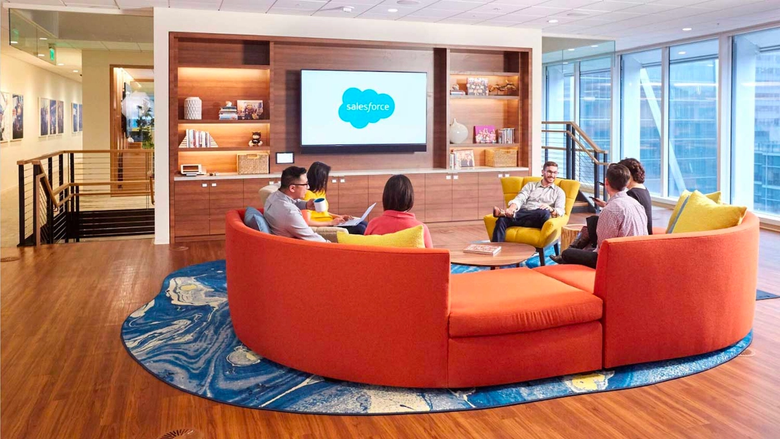Salesforce Benefits: Why You Should Consider Applying
Learn about some of the best benefits in tech
Salesforce has made waves in the tech world ever since its conception in 1999. The cloud-based computing company offers customers a wide range of customer relationship management (CRM) tools to help them increase the efficiency of their business.
Within the organization, Salesforce has helped employees thrive. Part of this people-first focus comes from CEO Marc Benioff, who has instilled important ethical values in the culture. In multiple interviews throughout the years, he uses the "Ohana spirit," inspired by the traditional Hawaiian philosophy of what it means to be family, to describe the culture of Salesforce. Professional relationships amongst employees are described as nurturing and supportive: everyone looks out for each other and promotes success in their teammates.

Photo credit: Work Design
With a culture like this, it's no surprise that the perks are fantastic. On Glassdoor, a Senior Solutions Engineer explained:
“They don't just talk about caring for their employees, they take action on it. Work-Life Balance is REAL and you will get a talking to if you don't take care of yourself first."
Here's everything you need to know about Salesforce's amazing benefits!
Cover All Your Health Needs

Photo credit: Salesforce
Health insurance is a major consideration for any new position. Luckily, Salesforce has options for any situation and budget.
An Associate Technical Consultant at Salesforce raved about the health insurance on Glassdoor:
"The benefits at Salesforce are the best I've ever seen. Health insurance is cheap, for actually extremely good plans. The lowest tier is completely free! Good dental and vision care too."
Here are specifics on medical, dental, and vision:
- Medical: Salesforce offers a wide range of healthcare plans with various premiums, deductibles, and types of coverage. Most plans are available through Aetna or UHC, some of the best insurance companies in the world. It is also worth noting that Salesforce offers Health Savings Accounts (HSAs) through some Aetna plans. These accounts help you set aside money for healthcare expenses, tax-free! Through some plans, Salesforce makes contributions to your HSA.
- Dental: There are also a broad array of plans. All cover annual checkups and basic dental work. Outside of that, plans and pricing vary based on your needs, like frequent dental work, orthodontics, or heavy-duty surgeries.
- Vision: There are two plans, standard or premium. Both cover annual eye exams (with only a small deductible), some of the cost of new glasses, and other basic vision costs. As you might expect, the premium plan provides more coverage for a higher cost.
With so many options available, how are you supposed to choose? To start, use this tool, which Salesforce calls Alex. Alex is a digital assistant, designed to walk employees through their benefits options. It asks for basic information, like family status, location, and salary, then begins recommending the best benefits for you. Users can ask for thorough explanations, do side-by-side comparisons of plans, and offer feedback throughout the process.
According to Glassdoor employee reviews, Salesforce does a great job in this department. Health insurance is rated 4.6/5 stars, with praise doled out heavily for the number of options and prices available. The ability to customize your health insurance to best fit your individual needs is a huge plus.
Competitive Financial Benefits

Photo credit: Work Design
Decent 401k options
Salesforce offers its employees a 100% match up to 6% of the individual’s salary. While the rate is very good, the company stops matching at $5,000 per year, which is on the low side for large technology companies. However, this does mean it’s easy to max out your 401k savings each year, which most employees claim to do.
Life & disability insurance
Like most tech companies, Salesforce offers comprehensive insurance options in these domains. Here's what you can expect.
- Life Insurance: Supplied through MetLife. Provides 2x the amount of eligible pay and maxes out at $1.5 million.
- Short Term Disability: For most employees, it will cover 80% of on-target earnings, up to $5,000 per week.
- Long Term Disability: For all employees, it will cover 66.67% of on-target earnings. The duration of the plan, and the extent of coverage after returning to work, varies widely.
Employees say these benefits are in line with tech companies of a similar caliber. They are comprehensive and well-executed, leaving little room for concern.
Employee stock purchase plan (ESPP)
Employee Stock Purchase Plans, as the name suggests, allow employees to purchase stock in the company they work for. Stocks are sold to employees at a discounted price, with hopes of incentivizing them to buy.
At Salesforce, employees pay the lower of two prices (offering date and purchase date price) and get an additional 15% discount on shares. Under this plan, employees can use up to 15% of their income (after taxes) to purchase stock.
Compared to other tech companies, the plan is pretty good. Some companies don't offer ESPPs at all, but have heavy RSU components in their compensation packages (i.e. Amazon, Google). Many large companies who offer ESPP provide a 15% discount, but max out at 10% of income (i.e. LinkedIn, Apple).
Generous Family Care & Planning

Photo credit: Salesforce
Salesforce provides a ton of support in building and caring for family. Here are a few of the benefits that employees have access to.
Best parental leave policy out there
Salesforce has one of the most generous policies in the tech world. Primary caregivers are granted a 26-week leave after having a child and secondary caregivers are granted a 12-week parental leave.
During this time, Salesforce also provides a $250 meal stipend, which can be used for takeout from restaurants. The company understands that becoming a new parent is hectic, and wants to ease the burden of cooking.
Hoping to become a parent? Salesforce offers a lot of support
There are a number of support options for employees hoping to have a child. Benefits are available for those looking to adopt and conceive naturally.
- Fertility: Under Aetna and UHC plans, employees have access to the fertility service Progyny. Salesforce covers three "SMART cycles," which include everything from consultation to treatment. Aside from that, Salesforce covers 90% of costs after you reach your deductible.
- Surrogacy: The Progyny service also covers up to $10,000 in expenses related to surrogacy, including carrying and giving birth to the child.
- Adoption: Salesforce covers up to $10,000 in adoption-related expenses, including fees, travel, medical expenses, and more.
- Support: Through Cleo, new/expecting parents have access to personalized support and coaching, designed to make parenthood easier to navigate.
In this department, Salesforce benefits are considered some of the best in the world, alongside companies like Spotify and Boston Consulting Group. Learn more about fertility benefits in tech here.
Caring for children
Salesforce provides priority access to Bright Horizons childcare centers.
Additionally, all eligible employees have 10 days of "back-up child care" available each year. This is low-cost, high-quality childcare, available at centers or in your own home. During Covid, this offering has expanded. According to an article on salesforce.com, "employees can get reimbursed up to $100 per day for 5 days each month."
Amazing Paid Time Off (PTO) Policy

Photo credit: Salesforce
Work-life balance is something that Salesforce strives for. As such, they have a generous paid time off policy. Like many companies, they have 10 standard holidays. However, they offer an additional 4 floating holidays to accommodate other religious traditions, Juneteenth, Veteran's Day, or even your birthday.
Time off whenever you need it with unlimited PTO
Salaried employees are given no limit to their paid time off and are encouraged to take it when they need it (after receiving approval from a manager).
According to employee reviews, this can be both a blessing and a curse:
- On the plus side, the company respects your time off and is extremely flexible in scheduling.
- On the downside, you won’t be paid out for any days you decided not to take, like you would be on limited plans.
Take time off to volunteer
Salesforce offers 7 days per year for Volunteer Time Off (VTO), which they strongly encourage employees to take. According to the company website, top volunteers are offered a $10,000 grant to a nonprofit of their choosing. Additionally, employees who use all 7 days of VTO are entered into a drawing for a $500 "Volunteer Rockstar Grant."
Other Perks

Photo credit: Work Design
Although they have less functionality than some of the benefits listed above, little perks are often employee favorites. Here are a few things employees enjoy:
- A wide variety of free snacks in the office
- Discounts on just about everything (through Fond)
- Commuter benefits, like a pretax account for commuting expenses, or free shuttle services/bike amenities at the San Francisco HQ
- Educational reimbursement for job-related courses (up to $5,250 per year)
- A $100 wellbeing reimbursement each month. It covers everything from fitness classes and nutrition coaching to chiropractors, cooking classes, and sleep support
- A dog-friendly workplace. At the headquarters, employees can reserve a desk in a dog-friendly room and bring their pet to work

Photo credit: Work Design
Overall, the ecosystem built by Salesforce employees and leadership is incredibly supportive. Team members are offered generous benefits packages, regardless of their department or workflow. Salesforce offers an intriguing culture and some of the best benefits in the tech world. When applying to your next job, keep this company on your list.
To see open positions, click here.
The information provided herein is for general informational purposes only and is not intended to provide tax, legal, or investment advice and should not be construed as an offer to sell, a solicitation of an offer to buy, or a recommendation of any security by Candor, its employees and affiliates, or any third-party. Any expressions of opinion or assumptions are for illustrative purposes only and are subject to change without notice. Past performance is not a guarantee of future results and the opinions presented herein should not be viewed as an indicator of future performance. Investing in securities involves risk. Loss of principal is possible.
Third-party data has been obtained from sources we believe to be reliable; however, its accuracy, completeness, or reliability cannot be guaranteed. Candor does not receive compensation to promote or discuss any particular Company; however, Candor, its employees and affiliates, and/or its clients may hold positions in securities of the Companies discussed.
